Imagine looking in the mirror and seeing clear, radiant skin where once stubborn acne scars spoiled your complexion.
It sounds like a dream, right? But it doesn’t have to be.
Acne scars aren’t just a physical blemish; they can cut deep, affecting your self-esteem and how you interact with the world. Studies show that nearly 85% of people between the ages of 12 and 24 experience acne, and for many, those breakouts leave behind lasting scars.
The emotional toll can be overwhelming, as these scars serve as constant reminders of past battles with your skin. But here’s the good news: you don’t have to live with them forever.
The natural remedies you’re about to discover in this post aren’t just old wives’ tales—they actually work. Thousands of people, just like you, have successfully faded their acne scars using simple, natural ingredients found right in their kitchens.
And now, it’s your turn. These home remedies have been tried, tested, and proven to transform skin, giving you the confidence to face the world. Each remedy is not only backed by science but also easy to incorporate into your daily routine.
Ready to start? Let’s transform those scars together and let’s start understanding more about acne scars.
What are Acne Scars?
Acne scars are the marks left on the skin after severe or prolonged acne has healed.
While acne itself is a common skin condition that affects nearly 85% of people aged 12 to 24, not everyone who suffers from acne will develop scars.
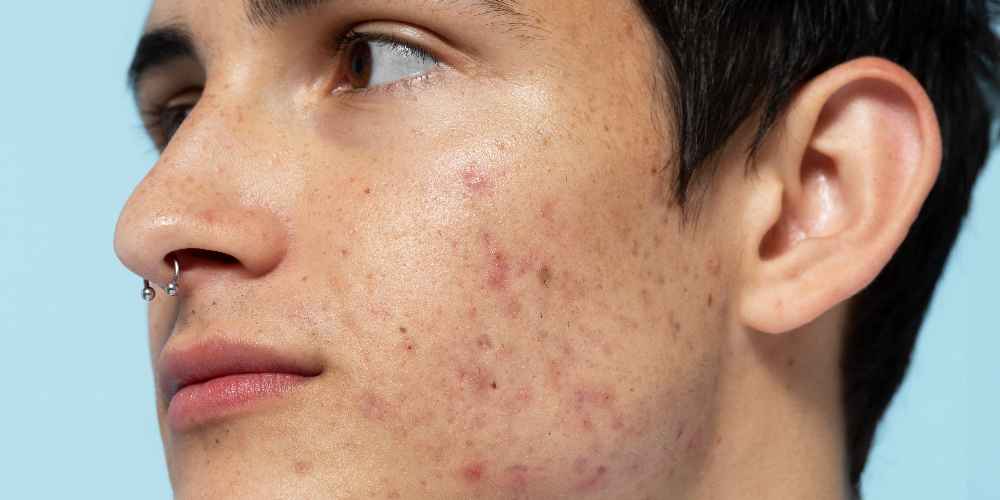
Scarring usually occurs when the inflammation from acne damages the skin’s tissue. When the body attempts to repair this damage, it produces collagen, a crucial protein that gives skin its structure and firmness. However, the body sometimes produces either too much or too little collagen, leading to the formation of a scar.
Types of Acne Scars
Acne scars are generally categorized into two main types: atrophic scars and hypertrophic scars.
Atrophic Scars: These scars are the most common and occur when there is a loss of tissue, leading to depressed or sunken areas on the skin.
Atrophic scars include three subtypes. Ice pick scars are narrow, deep scars that resemble tiny punctures in the skin, making them difficult to treat due to their depth. Boxcar scars, on the other hand, are wider and have more defined edges, creating a pitted appearance similar to that of a box.
Rolling scars give the skin a wave-like texture, caused by bands of fibrous tissue that pull the skin downward, leading to uneven skin surfaces.
Hypertrophic Scars: Unlike atrophic scars, hypertrophic scars are characterized by an excess of tissue, resulting in raised, thickened areas on the skin. These scars typically remain within the boundaries of the original acne lesion but can be more prominent and noticeable.
In some cases, hypertrophic scars can develop into keloid scars, which extend beyond the original site of the acne lesion. Keloid scars are often raised, firm, and can cause discomfort such as itching or tenderness. They are more common on the chest, back, and shoulders but can also appear on the face, particularly in individuals with darker skin tones.
Causes of Acne Scars
Acne scars are the result of damage caused by severe acne lesions, and their formation is influenced by several factors related to the acne itself and the body’s healing response. Here are some of the most common causes of acne scars:
Inflammation and Irritation
When acne occurs, it triggers inflammation and irritation in the affected skin. This inflammation damages not only the surface of the skin but also the deeper layers.
The resulting irritation disrupts the skin’s normal healing process, which can lead to scarring. The greater the inflammation, the more extensive the damage, increasing the likelihood of permanent scars.
Collagen Production Imbalance
Collagen is a key protein responsible for the skin’s strength and elasticity. During the healing process, the body produces new collagen to repair the damaged areas caused by acne.
However, this repair process can be imbalanced. If too much collagen is produced, it leads to raised scars, such as hypertrophic or keloid scars. On the other hand, if too little collagen is produced, the skin forms depressions or indentations, resulting in atrophic scars.
This imbalance between collagen production and destruction plays a crucial role in the formation of different types of acne scars.
Picking or Squeezing
When acne lesions are picked at or squeezed, it exacerbates the inflammation and irritation. This manual interference not only worsens the existing damage but also disrupts the skin’s natural healing process.
By increasing inflammation and possibly introducing bacteria into the lesion, picking or squeezing can significantly heighten the risk of scarring.
Severity of Acne
The severity of acne greatly influences the extent of scarring. Severe acne, such as cystic acne or nodular acne, affects the deeper layers of the skin and causes significant damage.
These types of acne lesions are more likely to leave behind scars compared to milder forms of acne. The deeper and more inflamed the acne, the more likely it is to disrupt the skin’s structure, leading to noticeable scars.
Genetic Factors
Genetics play a significant role in how the skin heals and scars. Some individuals are genetically predisposed to developing scars more readily than others.
This predisposition can influence the skin’s healing process and the likelihood of scar formation. For example, people with a family history of severe scarring or keloids may be more susceptible to developing similar scars.
Skin Type and Color
The type and color of an individual’s skin can also affect scar formation. For instance, individuals with darker skin tones are more prone to developing hyperpigmentation, where scars appear darker than the surrounding skin.
Additionally, some people may be more prone to keloid scarring, where scars extend beyond the original acne lesion. The skin’s natural response to healing and its ability to repair itself can vary based on skin type and color, influencing how scars develop and fade over time.
Also Read: How to get clear skin? 20 Tips That Include Everything
Best Natural Ingredients to Incorporate for Fading Acne Scars
Now let’s talk about some of the best natural ingredients that you should look for to fade acne scars:
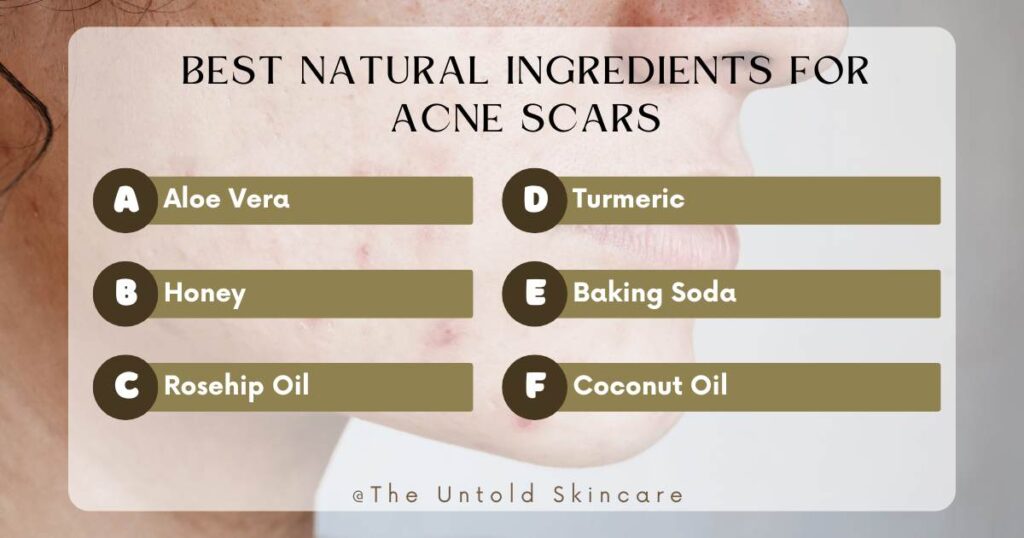
Aloe Vera
Aloe vera is often referred to as a “miracle plant” for its wide range of health benefits, and skincare is no exception.
Aloe vera is renowned for its soothing and healing properties. It contains compounds like polysaccharides and glycoproteins that promote skin repair and reduce inflammation. Packed with vitamins C and E, aloe vera promotes collagen production, which is crucial for healing scars.
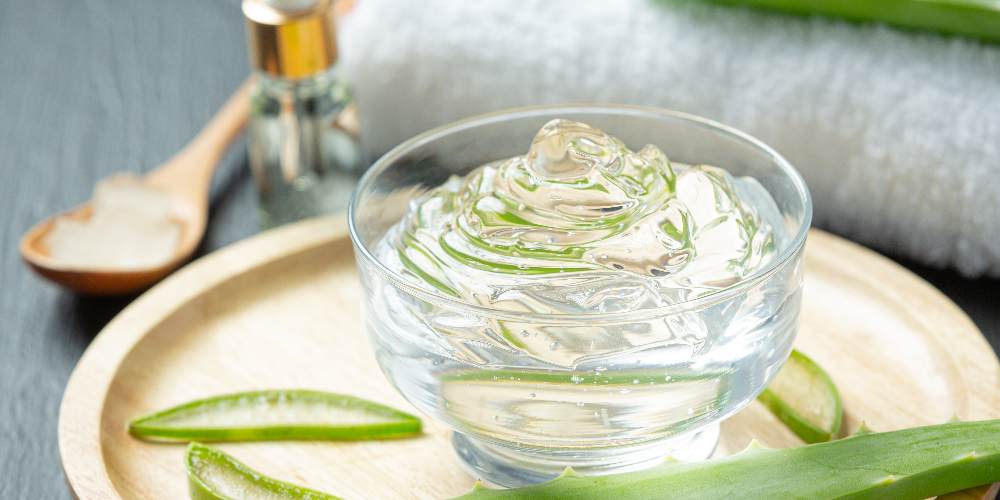
Aloe vera also helps to moisturize the skin, and accelerate wound healing, making it further effective in reducing the appearance of acne scars.
A 2019 study in the Journal of Clinical and Aesthetic Dermatology showed that aloe vera significantly improved the appearance of post-acne scars after just eight weeks of consistent use.
Honey
Honey, particularly raw or Manuka honey, is a powerful natural humectant, which means it helps to retain moisture in the skin. Its antimicrobial properties can help prevent infections and reduce inflammation.
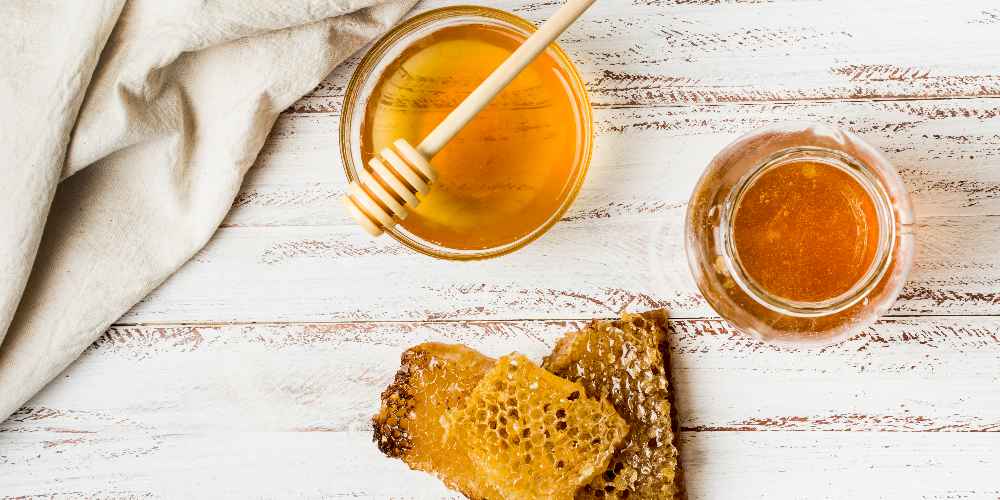
Honey also promotes skin regeneration and healing by providing essential nutrients and enzymes that aid in the repair of damaged skin. Regular use of honey can help lighten scars and improve skin texture.
A study published in the Asian Pacific Journal of Tropical Biomedicine found that honey’s natural enzymes help exfoliate the skin, aiding in the reduction of scar appearance. Honey is also rich in antioxidants, which protect the skin from free radical damage and accelerate the healing process.
Rosehip Oil
Rosehip oil is packed with essential fatty acids, vitamins A and C, and antioxidants. These components work together to promote skin regeneration, improve collagen production, and reduce hyperpigmentation.
Vitamin A in rosehip oil helps to increase cell turnover and fade dark spots, while vitamin C brightens the skin and enhances overall skin tone.
Turmeric

Turmeric contains curcumin, a powerful antioxidant with anti-inflammatory and skin-brightening properties. Curcumin helps to reduce redness, swelling, and hyperpigmentation associated with acne scars.
It also promotes the healing of damaged skin and can help lighten dark spots. Turmeric can be used in masks or mixed with other soothing ingredients like yogurt or honey for enhanced benefits.
A 2016 study in the Journal of Clinical and Aesthetic Dermatology demonstrated turmeric’s effectiveness in reducing hyperpigmentation and improving overall skin tone.
Baking Soda
Baking soda acts as a gentle exfoliant, helping to remove dead skin cells and promote cell turnover. This exfoliation process can help smooth out uneven skin texture and reduce the appearance of acne scars.
Additionally, baking soda has mild anti-inflammatory properties that can help soothe irritated skin. It’s important to use baking soda sparingly, as excessive exfoliation can irritate the skin.
A study published in the Journal of Dermatological Treatment noted that exfoliation with baking soda can improve skin texture and reduce scar visibility when used consistently.
Coconut Oil

Coconut oil is rich in fatty acids, such as lauric acid, which have moisturizing and anti-inflammatory properties. It helps to hydrate the skin, repair damaged tissue, and reduce redness and swelling.
Coconut oil also contains antioxidants that protect the skin from further damage and promote healing. Its emollient properties can help soften and smooth scarred skin.
A 2018 study in the International Journal of Molecular Sciences found that coconut oil can boost collagen production and improve the overall healing process of the skin.
Also Read: Dermatologist-Recommended Skincare Products for Oily Skin
How to Use These Ingredients to Make The Best Home Remedies for Acne Scars
Finally, here is how you can use those ingredients to make some of the best natural home remedies for acne scars:
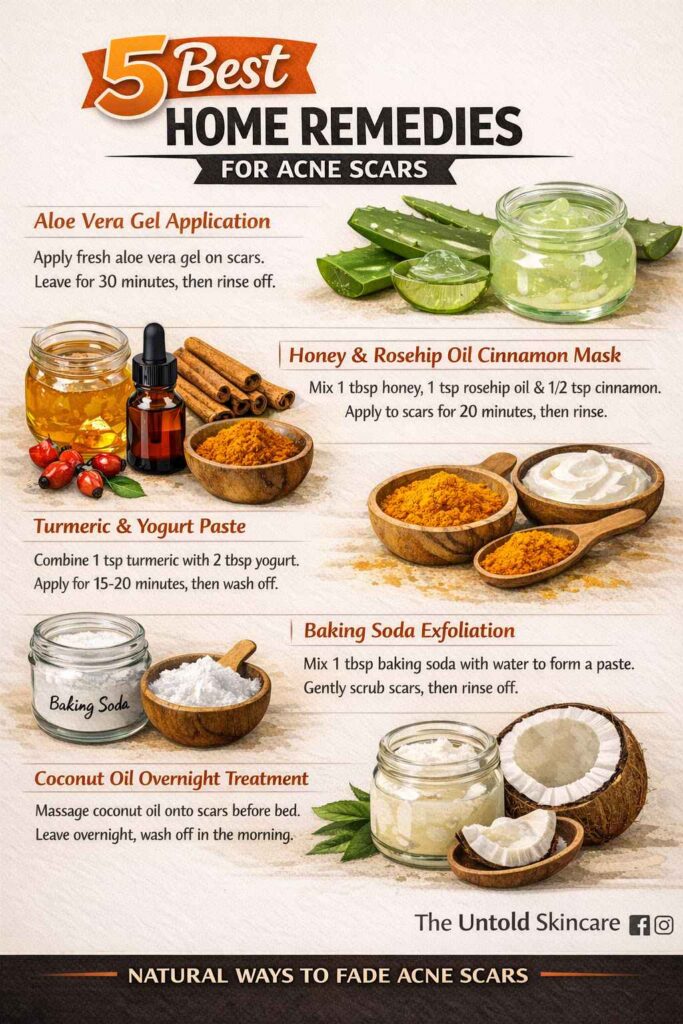
Aloe Vera Gel Application
This is probably the best natural home remedy for acne scars if done consistently.
To harness the benefits of aloe vera, simply extract fresh aloe vera gel from a leaf and apply it directly to your scars. Gently massage the gel into your skin for about five minutes, allowing it to fully absorb. Leave it on for at least 30 minutes before rinsing off with lukewarm water. For best results, repeat this process twice daily.
Honey and Rosehip Oil with Cinnamon Mask
Combine one tablespoon of raw honey with a half teaspoon of cinnamon powder and half a tablespoon of rosehip oil to create a potent anti-scar mask. Apply this mixture evenly to your face, focusing on the scarred areas. Let it sit for 20 minutes before rinsing with warm water. This mask can be used two to three times a week for noticeable results.
Turmeric and Yogurt Paste
Create a brightening mask by mixing one teaspoon of turmeric with two tablespoons of plain yogurt. Apply the paste to your face, concentrating on scarred areas. Leave it on for 15 minutes before rinsing with warm water. Use this mask two to three times a week to see significant improvements in scar appearance.
Baking Soda Exfoliation
To exfoliate with baking soda, mix one teaspoon of baking soda with two teaspoons of rosehip or coconut oil to form a paste. Gently massage this paste onto your scars in circular motions for about one minute, then rinse off with warm water. Use this exfoliant no more than twice a week to avoid over-exfoliation.
Coconut Oil Overnight Treatment
Apply a small amount of virgin coconut oil directly to your scars before bedtime. Gently massage it into your skin until fully absorbed. Leave it on overnight and wash off any residue in the morning. This remedy can be used daily for ongoing hydration and scar reduction.
Ways to increase the effectiveness of Natural Home Remedies for Acne Scars
Here’s a concise list of ways to increase the effectiveness of natural remedies for acne scars:
- Drink plenty of water to support skin health.
- Apply remedies regularly as directed.
- Avoid poking the pimples.
- Mix complementary ingredients to boost results.
- Use gentle exfoliants to remove dead skin cells.
- Keep skin hydrated with a suitable moisturizer.
- Eat foods rich in vitamins and antioxidants.
Frequently Asked Questions
Frequently Asked Questions
1. How long does it take to see results from natural remedies for acne scars?
The time it takes to see noticeable results from natural remedies can vary depending on the severity of the scars and the individual’s skin type. Generally, you may start to see improvements within 4 to 6 weeks of consistent use. However, for optimal results, it’s important to continue using the remedies regularly and to be patient, as natural treatments often take longer than medical options.
2. Can these natural remedies be used on all skin types?
Most natural remedies are suitable for various skin types, but it’s essential to consider your skin’s unique needs and sensitivities.
3. Are there any side effects associated with these natural remedies?
All the remedies mentioned above have almost no side effects and are quite safe to use.
4. Can these remedies be used in combination with other acne treatments?
Yes, many natural remedies can be used alongside other acne treatments, but it’s important to be cautious of potential interactions. If you’re using prescription or over-the-counter acne medications, consult with your healthcare provider to ensure that the natural remedies you choose won’t interfere with your existing treatments.
5. How often should I apply these remedies to see results?
The frequency of application can vary based on the specific remedy and your skin’s tolerance. Generally, applying the remedy 2 to 3 times a week is recommended for most treatments.
6. Can these natural remedies prevent new acne from forming?
While these remedies are primarily aimed at reducing the appearance of existing acne scars, some ingredients, such as honey, have antibacterial properties that may help prevent new acne outbreaks. Maintaining a consistent skincare routine that includes cleansing, moisturizing, and protecting your skin can also help prevent future acne.
7. What should I do if I don’t see improvement?
If you don’t see improvement after several weeks of using natural remedies, it may be worth considering other treatment options. Acne scars can be stubborn, and in some cases, professional treatments such as laser therapy, microneedling, or chemical peels may be necessary. Consulting with a dermatologist can provide you with personalized recommendations and alternative treatments.
8. Can I use these remedies if I have active acne?
It’s best to avoid using remedies that might irritate or dry out the skin if you have active acne. Focus on treating active acne with gentle, non-comedogenic products and consider using scar treatments only after the acne has healed.
9. How can I enhance the effectiveness of these natural remedies?
To enhance the effectiveness of natural remedies, incorporate them into a consistent skincare routine. Ensure you follow a balanced diet, stay hydrated, and protect your skin from sun exposure. Additionally, combining remedies with gentle exfoliation and moisturizing can help improve the overall appearance of your skin.
10. Are there any lifestyle changes that can help reduce acne scars?
Yes, adopting a healthy lifestyle can support the healing of acne scars. Eating a balanced diet rich in vitamins and antioxidants, staying hydrated, and avoiding excessive sun exposure can all contribute to better skin health. Additionally, managing stress and avoiding smoking can improve your skin’s ability to heal and regenerate.





